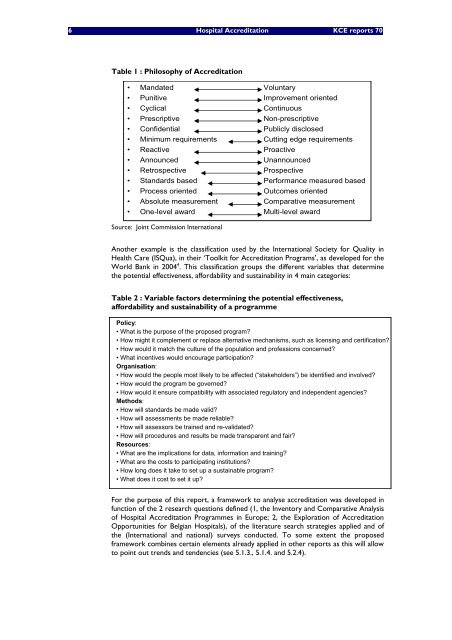Vergelijkende studie van ... - KCE
Vergelijkende studie van ... - KCE
Vergelijkende studie van ... - KCE
Create successful ePaper yourself
Turn your PDF publications into a flip-book with our unique Google optimized e-Paper software.
6 Hospital Accreditation <strong>KCE</strong> reports 70<br />
Table 1 : Philosophy of Accreditation<br />
• Mandated Voluntary<br />
• Punitive Improvement oriented<br />
• Cyclical Continuous<br />
• Prescriptive Non-prescriptive<br />
• Confidential Publicly disclosed<br />
• Minimum requirements Cutting edge requirements<br />
• Reactive Proactive<br />
• Announced Unannounced<br />
• Retrospective Prospective<br />
• Standards based Performance measured based<br />
• Process oriented Outcomes oriented<br />
• Absolute measurement Comparative measurement<br />
• One-level award Multi-level award<br />
Source: Joint Commission International<br />
Another example is the classification used by the International Society for Quality in<br />
Health Care (ISQua), in their ‘Toolkit for Accreditation Programs’, as developed for the<br />
World Bank in 2004 4 . This classification groups the different variables that determine<br />
the potential effectiveness, affordability and sustainability in 4 main categories:<br />
Table 2 : Variable factors determining the potential effectiveness,<br />
affordability and sustainability of a programme<br />
Policy:<br />
• What is the purpose of the proposed program?<br />
• How might it complement or replace alternative mechanisms, such as licensing and certification?<br />
• How would it match the culture of the population and professions concerned?<br />
• What incentives would encourage participation?<br />
Organisation:<br />
• How would the people most likely to be affected (“stakeholders”) be identified and involved?<br />
• How would the program be governed?<br />
• How would it ensure compatibility with associated regulatory and independent agencies?<br />
Methods:<br />
• How will standards be made valid?<br />
• How will assessments be made reliable?<br />
• How will assessors be trained and re-validated?<br />
• How will procedures and results be made transparent and fair?<br />
Resources:<br />
• What are the implications for data, information and training?<br />
• What are the costs to participating institutions?<br />
• How long does it take to set up a sustainable program?<br />
• What does it cost to set it up?<br />
For the purpose of this report, a framework to analyse accreditation was developed in<br />
function of the 2 research questions defined (1, the Inventory and Comparative Analysis<br />
of Hospital Accreditation Programmes in Europe; 2, the Exploration of Accreditation<br />
Opportunities for Belgian Hospitals), of the literature search strategies applied and of<br />
the (International and national) surveys conducted. To some extent the proposed<br />
framework combines certain elements already applied in other reports as this will allow<br />
to point out trends and tendencies (see 5.1.3., 5.1.4. and 5.2.4).

















